The Rewilding of Humanity
The Future of Indigenous Environmental Stewardship is Re(Wild).

Futures Narrative
October 2023


It feels more important than ever, that we begin the work of working to practice imagining possible alternative futures for first nations people.
/ Australian Context
On 14 October 2023, Australians voted NO in a referendum on whether to change the 1898 constitution to recognise the First Peoples of Australia through the establishment of a Voice to Parliament, which would advise the government about laws as they relate to indigenous peoples.
The Voice was the first recommendation from the Uluru Statement, which also includes a treaty-making and truth-telling process, aimed at reconciling Australia's past and the ongoing exclusion of indigenous peoples from Australia's imagined futures, and the systems which enable those imagined futures to develop.
Whilst initial support suggested the Voice to Parliament would proceed, it was ultimately defeated and the public's appetite for further truth and treaty work has since dropped significantly. Richard Flanagan's message 'that we continue to enshrine ourselves in the European / American imagination', identifies the urgency with which Australians must work to reimagine Australian futures, from within the context of our own painful history and the first people who continue to be excluded from our national imagination and stories.
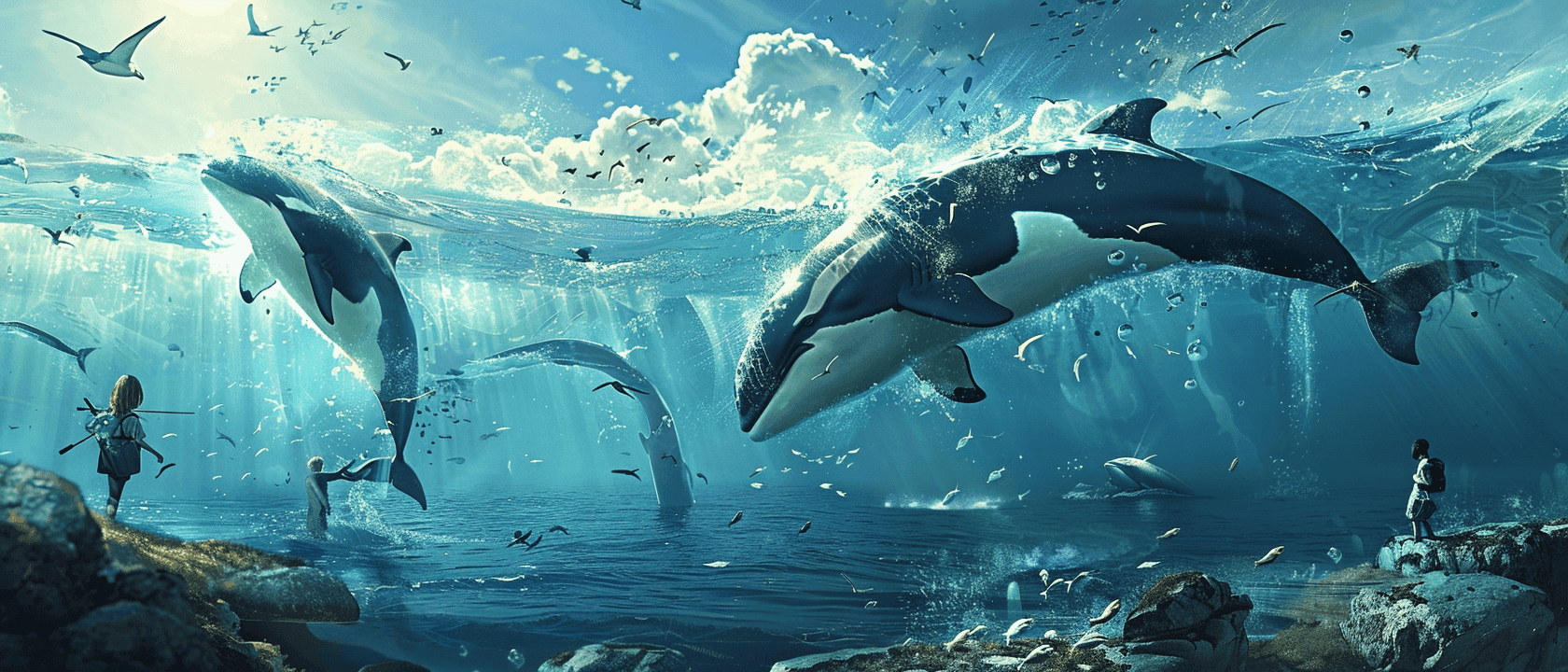
Future Wheels
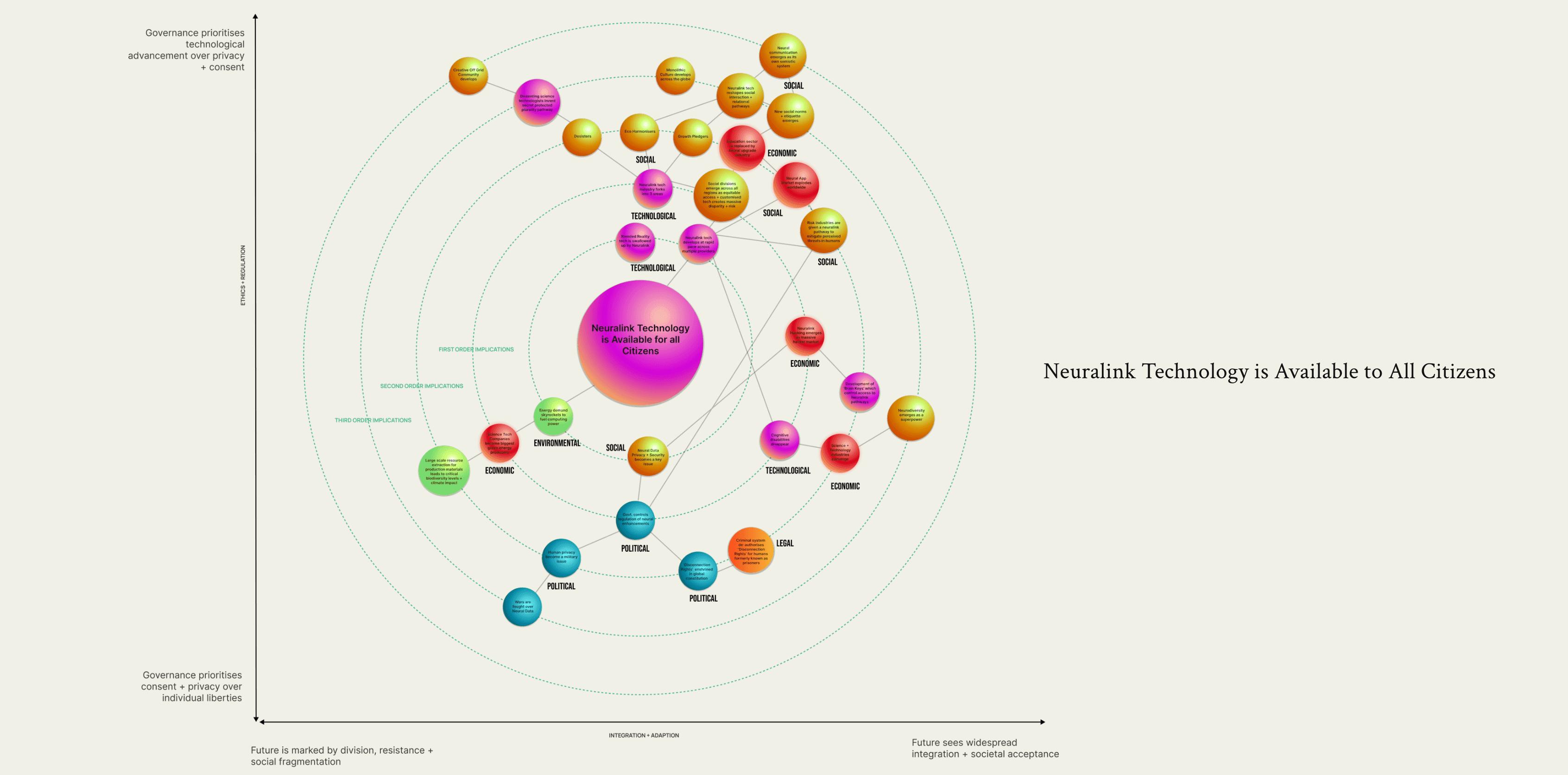
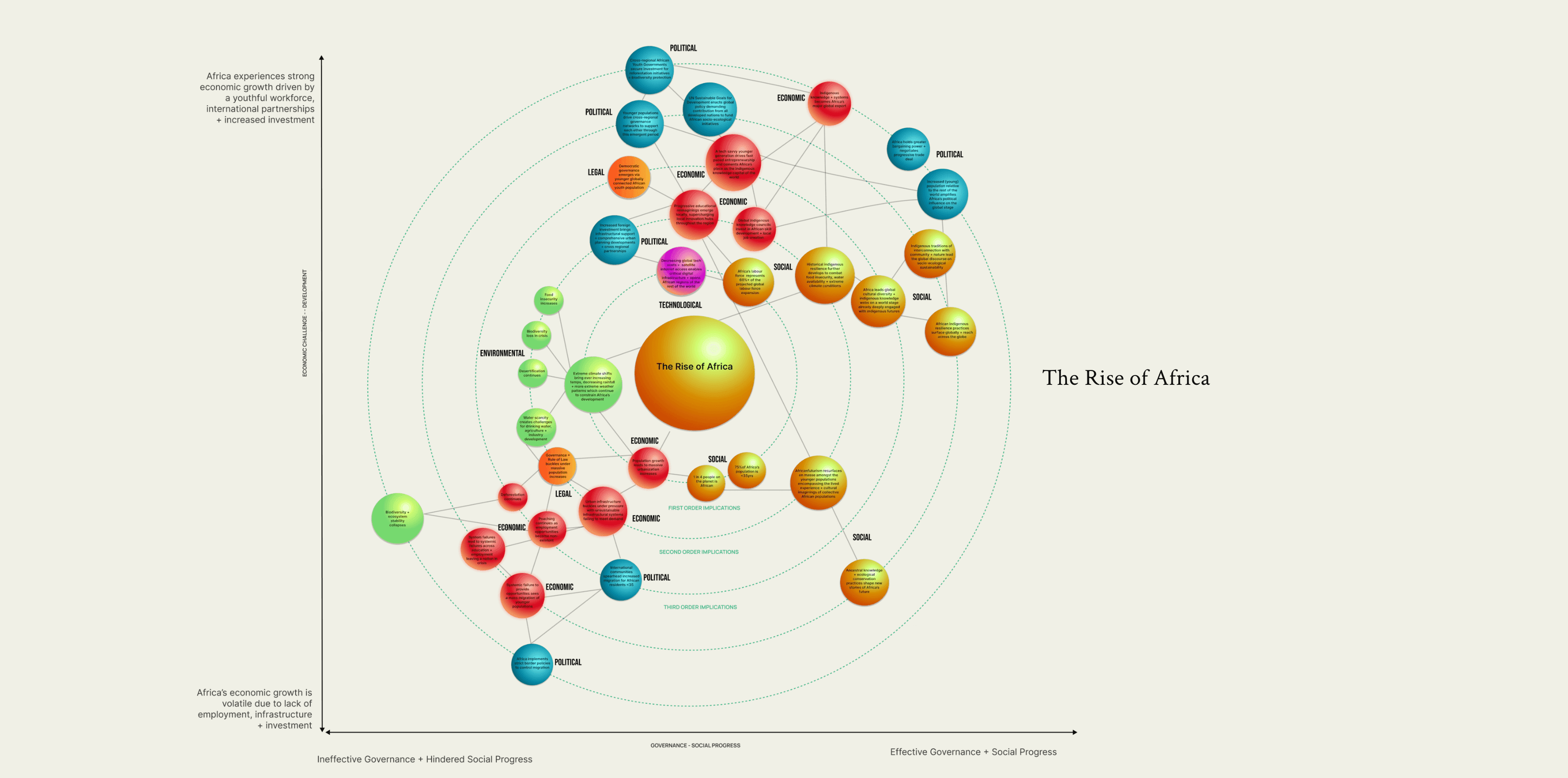

Cross Impact Analysis
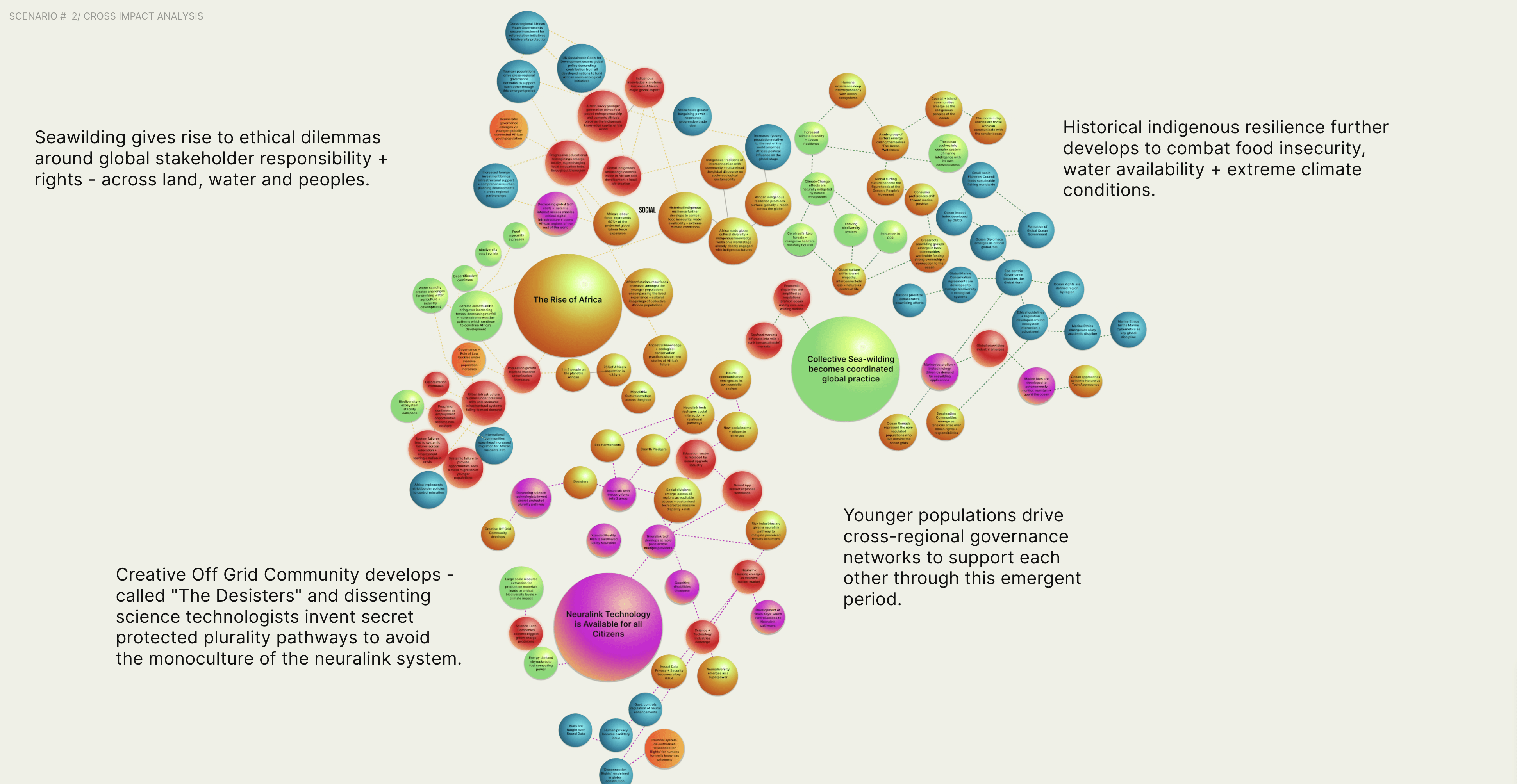
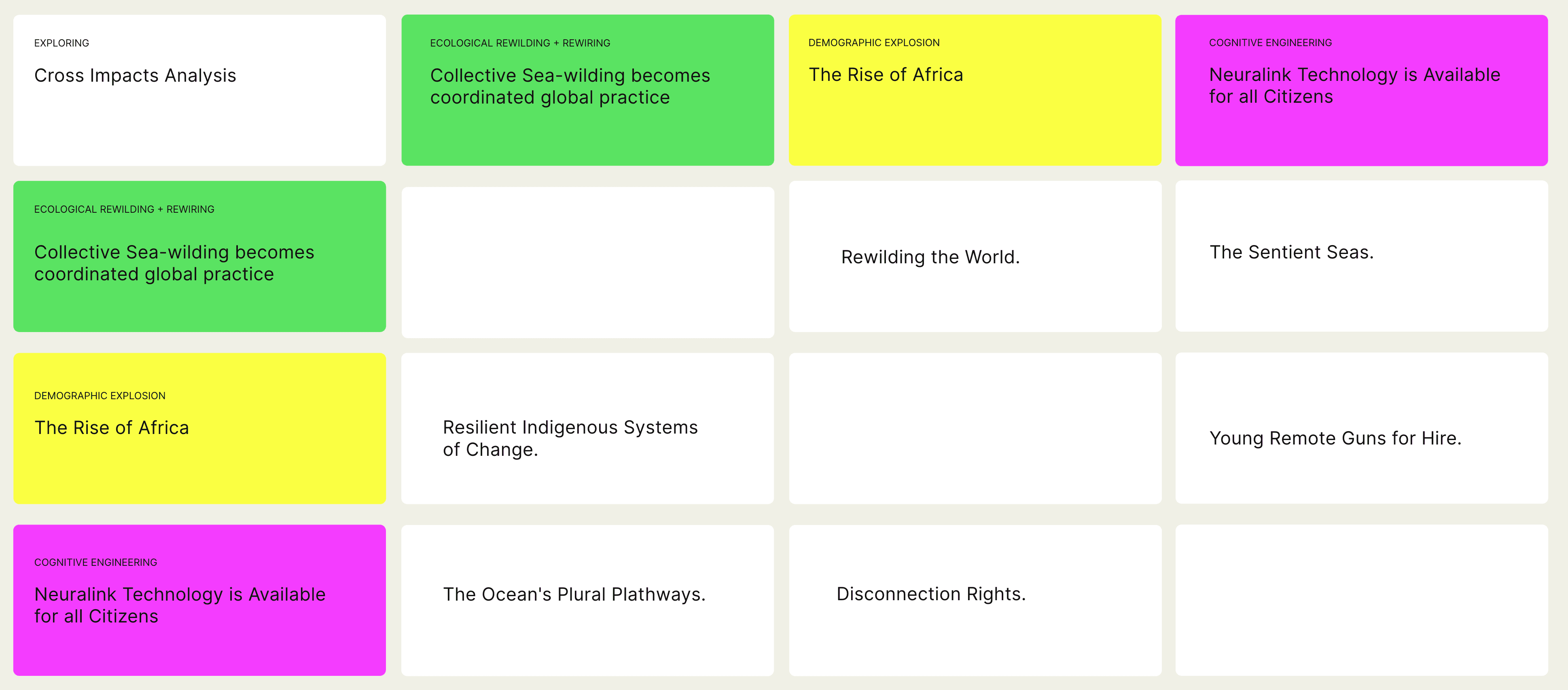
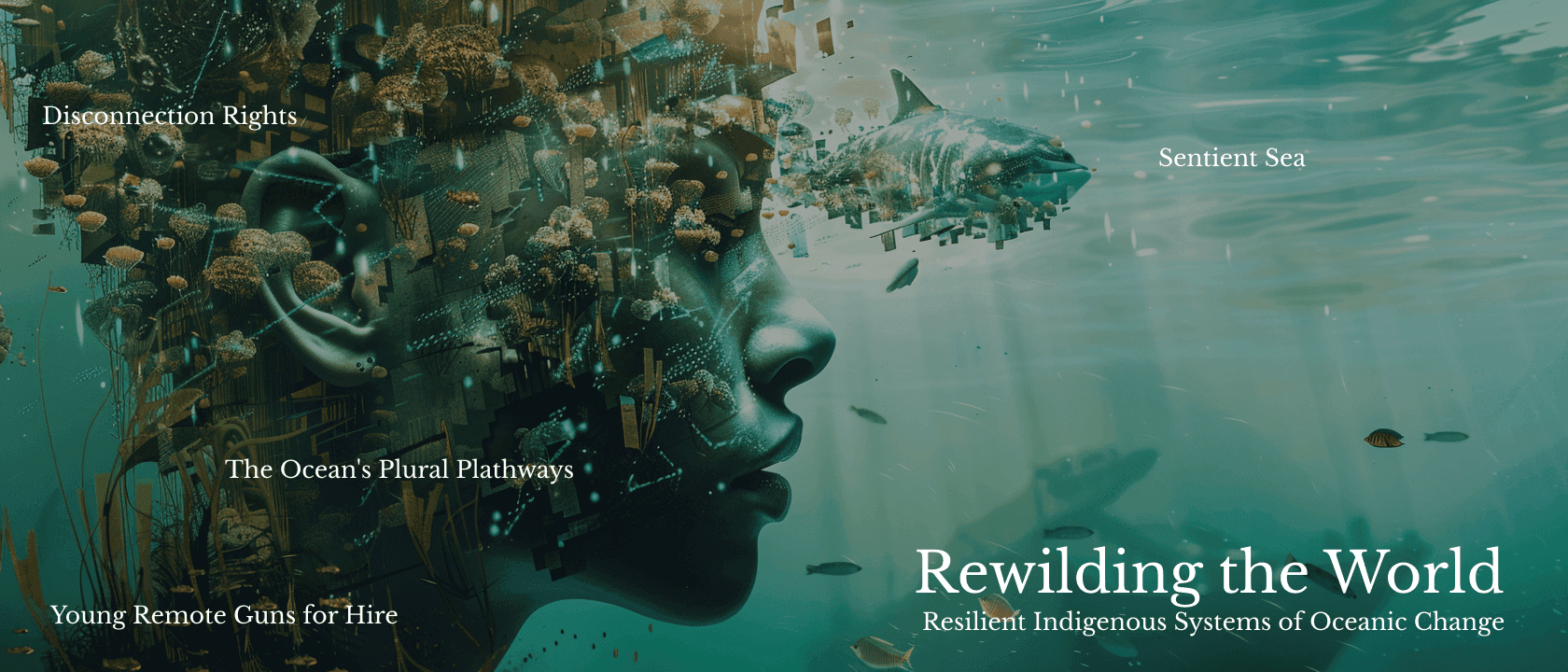
Scenario # | Rewilding the World
The Future of Indigenous Environmental Stewardship is African.
Technology has offered us the chance to connect, to learn and to communicate from the depths of our consciousness. Indeed neuralink has meant that each human being has the knowledge of the world at their fingertips. The rise of Africa's young guns for hire, has been the greatest human example of this genius at work. A young remote generation implanted at birth, and powering the world's economy, through a miniscule chip that means they never even have to leave their homeland. African resilience resilience develops further through indigenous African community knowledge circles, as they are faced with increasing food insecurity, water stress and extreme climatic conditions. Africanfuturism resurfaces en masse amongst this younger population, encompassing the lived experience + cultural imaginings of collective African populations as they straddle expanding economic opportunity within a climatically desolate homeland. Africa's criminal justice system is remotely reformed through the curtailing of neuralink disconnection rights and automatic feeds, and this burgeoning region supports the rest of the world's economies with increasing speed.
In a historic first, the UN Sustainable Goals for Development council implements a global policy demanding contribution from all developed nations to fund African socio-ecological rewilding initiatives to help them combat socio-ecological imbalances within their homeland. This young generation of African tech savvy citizens drive fast paced entrepreneurship and cements Africa’s place as the indigenous knowledge capital of the world.
But what has been lost with this progress? The monolithic culture and shared thought streams of the neuralink programs have engendered a sense of collective culture, but they have also reduced us to one intellectual people. Ironically it is through the African Indigenous Knowledge Commons, that we begin to understand, the power of nature's plurality. We see that our our own lands and oceans are fundamental systems of resilience . . and change. They are made up of thousands of localised nature pathways, deep and shallow, wide and narrow, each one is unique yet all lead back to the land and ocean economy. Through restorative indigenous practice, non-African humans learn to rewild nature's energy network of land and ocean cultures, slowly and simply . . body of water by body of water, region by region. And gradually over time, we realise that we are in fact . . rewilding ourselves in the process.
It feels more important than ever, that we begin the work of working to practice imagining possible alternative futures for first nations people.
/ Australian Context
On 14 October 2023, Australians voted NO in a referendum on whether to change the 1898 constitution to recognise the First Peoples of Australia through the establishment of a Voice to Parliament, which would advise the government about laws as they relate to indigenous peoples.
The Voice was the first recommendation from the Uluru Statement, which also includes a treaty-making and truth-telling process, aimed at reconciling Australia's past and the ongoing exclusion of indigenous peoples from Australia's imagined futures, and the systems which enable those imagined futures to develop.
Whilst initial support suggested the Voice to Parliament would proceed, it was ultimately defeated and the public's appetite for further truth and treaty work has since dropped significantly. Richard Flanagan's message 'that we continue to enshrine ourselves in the European / American imagination', identifies the urgency with which Australians must work to reimagine Australian futures, from within the context of our own painful history and the first people who continue to be excluded from our national imagination and stories.

Future Wheels



Cross Impact Analysis



Scenario # | Rewilding the World
The Future of Indigenous Environmental Stewardship is African.
Technology has offered us the chance to connect, to learn and to communicate from the depths of our consciousness. Indeed neuralink has meant that each human being has the knowledge of the world at their fingertips. The rise of Africa's young guns for hire, has been the greatest human example of this genius at work. A young remote generation implanted at birth, and powering the world's economy, through a miniscule chip that means they never even have to leave their homeland. African resilience resilience develops further through indigenous African community knowledge circles, as they are faced with increasing food insecurity, water stress and extreme climatic conditions. Africanfuturism resurfaces en masse amongst this younger population, encompassing the lived experience + cultural imaginings of collective African populations as they straddle expanding economic opportunity within a climatically desolate homeland. Africa's criminal justice system is remotely reformed through the curtailing of neuralink disconnection rights and automatic feeds, and this burgeoning region supports the rest of the world's economies with increasing speed.
In a historic first, the UN Sustainable Goals for Development council implements a global policy demanding contribution from all developed nations to fund African socio-ecological rewilding initiatives to help them combat socio-ecological imbalances within their homeland. This young generation of African tech savvy citizens drive fast paced entrepreneurship and cements Africa’s place as the indigenous knowledge capital of the world.
But what has been lost with this progress? The monolithic culture and shared thought streams of the neuralink programs have engendered a sense of collective culture, but they have also reduced us to one intellectual people. Ironically it is through the African Indigenous Knowledge Commons, that we begin to understand, the power of nature's plurality. We see that our our own lands and oceans are fundamental systems of resilience . . and change. They are made up of thousands of localised nature pathways, deep and shallow, wide and narrow, each one is unique yet all lead back to the land and ocean economy. Through restorative indigenous practice, non-African humans learn to rewild nature's energy network of land and ocean cultures, slowly and simply . . body of water by body of water, region by region. And gradually over time, we realise that we are in fact . . rewilding ourselves in the process.
It feels more important than ever, that we begin the work of working to practice imagining possible alternative futures for first nations people.
/ Australian Context
On 14 October 2023, Australians voted NO in a referendum on whether to change the 1898 constitution to recognise the First Peoples of Australia through the establishment of a Voice to Parliament, which would advise the government about laws as they relate to indigenous peoples.
The Voice was the first recommendation from the Uluru Statement, which also includes a treaty-making and truth-telling process, aimed at reconciling Australia's past and the ongoing exclusion of indigenous peoples from Australia's imagined futures, and the systems which enable those imagined futures to develop.
Whilst initial support suggested the Voice to Parliament would proceed, it was ultimately defeated and the public's appetite for further truth and treaty work has since dropped significantly. Richard Flanagan's message 'that we continue to enshrine ourselves in the European / American imagination', identifies the urgency with which Australians must work to reimagine Australian futures, from within the context of our own painful history and the first people who continue to be excluded from our national imagination and stories.

Future Wheels



Cross Impact Analysis



Scenario # | Rewilding the World
The Future of Indigenous Environmental Stewardship is African.
Technology has offered us the chance to connect, to learn and to communicate from the depths of our consciousness. Indeed neuralink has meant that each human being has the knowledge of the world at their fingertips. The rise of Africa's young guns for hire, has been the greatest human example of this genius at work. A young remote generation implanted at birth, and powering the world's economy, through a miniscule chip that means they never even have to leave their homeland. African resilience resilience develops further through indigenous African community knowledge circles, as they are faced with increasing food insecurity, water stress and extreme climatic conditions. Africanfuturism resurfaces en masse amongst this younger population, encompassing the lived experience + cultural imaginings of collective African populations as they straddle expanding economic opportunity within a climatically desolate homeland. Africa's criminal justice system is remotely reformed through the curtailing of neuralink disconnection rights and automatic feeds, and this burgeoning region supports the rest of the world's economies with increasing speed.
In a historic first, the UN Sustainable Goals for Development council implements a global policy demanding contribution from all developed nations to fund African socio-ecological rewilding initiatives to help them combat socio-ecological imbalances within their homeland. This young generation of African tech savvy citizens drive fast paced entrepreneurship and cements Africa’s place as the indigenous knowledge capital of the world.
But what has been lost with this progress? The monolithic culture and shared thought streams of the neuralink programs have engendered a sense of collective culture, but they have also reduced us to one intellectual people. Ironically it is through the African Indigenous Knowledge Commons, that we begin to understand, the power of nature's plurality. We see that our our own lands and oceans are fundamental systems of resilience . . and change. They are made up of thousands of localised nature pathways, deep and shallow, wide and narrow, each one is unique yet all lead back to the land and ocean economy. Through restorative indigenous practice, non-African humans learn to rewild nature's energy network of land and ocean cultures, slowly and simply . . body of water by body of water, region by region. And gradually over time, we realise that we are in fact . . rewilding ourselves in the process.
It feels more important than ever, that we begin the work of working to practice imagining possible alternative futures for first nations people.
/ Australian Context
On 14 October 2023, Australians voted NO in a referendum on whether to change the 1898 constitution to recognise the First Peoples of Australia through the establishment of a Voice to Parliament, which would advise the government about laws as they relate to indigenous peoples.
The Voice was the first recommendation from the Uluru Statement, which also includes a treaty-making and truth-telling process, aimed at reconciling Australia's past and the ongoing exclusion of indigenous peoples from Australia's imagined futures, and the systems which enable those imagined futures to develop.
Whilst initial support suggested the Voice to Parliament would proceed, it was ultimately defeated and the public's appetite for further truth and treaty work has since dropped significantly. Richard Flanagan's message 'that we continue to enshrine ourselves in the European / American imagination', identifies the urgency with which Australians must work to reimagine Australian futures, from within the context of our own painful history and the first people who continue to be excluded from our national imagination and stories.

Future Wheels



Cross Impact Analysis



Scenario # | Rewilding the World
The Future of Indigenous Environmental Stewardship is African.
Technology has offered us the chance to connect, to learn and to communicate from the depths of our consciousness. Indeed neuralink has meant that each human being has the knowledge of the world at their fingertips. The rise of Africa's young guns for hire, has been the greatest human example of this genius at work. A young remote generation implanted at birth, and powering the world's economy, through a miniscule chip that means they never even have to leave their homeland. African resilience resilience develops further through indigenous African community knowledge circles, as they are faced with increasing food insecurity, water stress and extreme climatic conditions. Africanfuturism resurfaces en masse amongst this younger population, encompassing the lived experience + cultural imaginings of collective African populations as they straddle expanding economic opportunity within a climatically desolate homeland. Africa's criminal justice system is remotely reformed through the curtailing of neuralink disconnection rights and automatic feeds, and this burgeoning region supports the rest of the world's economies with increasing speed.
In a historic first, the UN Sustainable Goals for Development council implements a global policy demanding contribution from all developed nations to fund African socio-ecological rewilding initiatives to help them combat socio-ecological imbalances within their homeland. This young generation of African tech savvy citizens drive fast paced entrepreneurship and cements Africa’s place as the indigenous knowledge capital of the world.
But what has been lost with this progress? The monolithic culture and shared thought streams of the neuralink programs have engendered a sense of collective culture, but they have also reduced us to one intellectual people. Ironically it is through the African Indigenous Knowledge Commons, that we begin to understand, the power of nature's plurality. We see that our our own lands and oceans are fundamental systems of resilience . . and change. They are made up of thousands of localised nature pathways, deep and shallow, wide and narrow, each one is unique yet all lead back to the land and ocean economy. Through restorative indigenous practice, non-African humans learn to rewild nature's energy network of land and ocean cultures, slowly and simply . . body of water by body of water, region by region. And gradually over time, we realise that we are in fact . . rewilding ourselves in the process.
It feels more important than ever, that we begin the work of working to practice imagining possible alternative futures for first nations people.
/ Australian Context
On 14 October 2023, Australians voted NO in a referendum on whether to change the 1898 constitution to recognise the First Peoples of Australia through the establishment of a Voice to Parliament, which would advise the government about laws as they relate to indigenous peoples.
The Voice was the first recommendation from the Uluru Statement, which also includes a treaty-making and truth-telling process, aimed at reconciling Australia's past and the ongoing exclusion of indigenous peoples from Australia's imagined futures, and the systems which enable those imagined futures to develop.
Whilst initial support suggested the Voice to Parliament would proceed, it was ultimately defeated and the public's appetite for further truth and treaty work has since dropped significantly. Richard Flanagan's message 'that we continue to enshrine ourselves in the European / American imagination', identifies the urgency with which Australians must work to reimagine Australian futures, from within the context of our own painful history and the first people who continue to be excluded from our national imagination and stories.

Future Wheels



Cross Impact Analysis



Scenario # | Rewilding the World
The Future of Indigenous Environmental Stewardship is African.
Technology has offered us the chance to connect, to learn and to communicate from the depths of our consciousness. Indeed neuralink has meant that each human being has the knowledge of the world at their fingertips. The rise of Africa's young guns for hire, has been the greatest human example of this genius at work. A young remote generation implanted at birth, and powering the world's economy, through a miniscule chip that means they never even have to leave their homeland. African resilience resilience develops further through indigenous African community knowledge circles, as they are faced with increasing food insecurity, water stress and extreme climatic conditions. Africanfuturism resurfaces en masse amongst this younger population, encompassing the lived experience + cultural imaginings of collective African populations as they straddle expanding economic opportunity within a climatically desolate homeland. Africa's criminal justice system is remotely reformed through the curtailing of neuralink disconnection rights and automatic feeds, and this burgeoning region supports the rest of the world's economies with increasing speed.
In a historic first, the UN Sustainable Goals for Development council implements a global policy demanding contribution from all developed nations to fund African socio-ecological rewilding initiatives to help them combat socio-ecological imbalances within their homeland. This young generation of African tech savvy citizens drive fast paced entrepreneurship and cements Africa’s place as the indigenous knowledge capital of the world.
But what has been lost with this progress? The monolithic culture and shared thought streams of the neuralink programs have engendered a sense of collective culture, but they have also reduced us to one intellectual people. Ironically it is through the African Indigenous Knowledge Commons, that we begin to understand, the power of nature's plurality. We see that our our own lands and oceans are fundamental systems of resilience . . and change. They are made up of thousands of localised nature pathways, deep and shallow, wide and narrow, each one is unique yet all lead back to the land and ocean economy. Through restorative indigenous practice, non-African humans learn to rewild nature's energy network of land and ocean cultures, slowly and simply . . body of water by body of water, region by region. And gradually over time, we realise that we are in fact . . rewilding ourselves in the process.
Tags
indigenous futures, environmental stewardship, rewilding, biocene, rise of Africa
⚒️ | Midjourney | Pitch
You might also like

Political Notion
Information Architecture

Political Notion
Information Architecture

Neurodiversity Resources
Concept Development

Neurodiversity Resources
Concept Development
🛠️ Tools + Resources